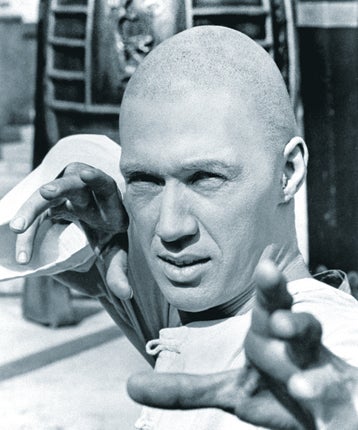David Carradine: Actor who found fame in the 1970s television series 'Kung Fu' and later in Tarantino's 'Kill Bill' films

The role of a shaven-headed, quiet and gentle Chinese-American Shaolin priest, who preached inner peace as he wandered the American West in the 1870s, searching for his long-lost brother, brought worldwide fame – and cult status – to David Carradine.
The mesmerising, mystical quality of the American television series Kung Fu (1972-75) was heightened by the use of flashbacks to Kwai Chang Caine's childhood, with scenes of polite temple life in China, where his mentor called him "Grasshopper", and the use of slow motion when he was forced to defend himself with the ancient martial art during his present-day hardships in the United States. On his wanderings, the priest championed Chinese railroad workers' rights while trying to avoid the bounty hunters sent after him from China following his murder of a Ming prince in self-defence.
Although Carradine followed Kung Fu by becoming one of the world's most prolific film actors, he was never an A-list star, but a Hollywood outsider who usually shunned the studio system for independent features. However, three decades after inspiring many viewers to learn kung fu, he found cult status again as the title character and anti-hero in the director Quentin Tarantino's Kill Bill, Vols 1 and 2 (2003, 2004).
Bill was the former lover and employer of an assassin (Uma Thurman) whom he ordered to be gunned down on her wedding day, when she was pregnant. The only survivor of the massacre, she was seen waking from a coma four years later, bent on revenge.
In the vein of Tarantino's Reservoir Dogs and Pulp Fiction, Kill Bill was bloodthirsty, this time a homage by the director to martial arts films. He also found some inspiration in Carradine's 1995 autobiography, Endless Highway.
The actor reflected that the two-part film – with release dates six months apart – marked his 75th on-screen death. "I've counted them up," he said. "I've also had one reincarnation and I've played a ghost, I think twice, and one undead. I played Dracula once [Sundown: The Vampire in Retreat, 1990]. It's the only picture ever made about Dracula where Dracula is the hero."
John Arthur Carradine was born in Los Angeles in 1936, the eldest son of the film character actor John Carradine. Also the half-brother of the actors Keith and Robert, he later changed his name to David to avoid confusion with his father.
He was educated at Oakland Junior College, California, and studied drama at San Francisco State College (now University), before military service in the US Army (1960-62).
After making his stage début as Tybalt in Romeo and Juliet (Playbox Theatre, Berkeley), he first appeared on Broadway in The Deputy (Brooks Atkinson Theatre, 1963) and subsequently starred there as Atahualpa, Sovereign Inca, in Peter Shaffer's play The Royal Hunt of the Sun (American National Theatre and Academy, 1965).
However, most of Carradine's career was spent on screen, following his television appearances in the plays Secret Document and Go Fight City Hall (both 1963). Several roles in episodes of Western series such as The Virginian (1964) brought the actor a starring part in his own such programme, the short-lived Shane (1966), based on the 1949 Jack Schaefer novel and the 1953 film starring Alan Ladd.
Later, Carradine capitalised on his Kung Fu fame and interest in Eastern philosophies by appearing in commercials and writing a book, The Spirit of Shaolin (1991), in which he recalled of his time in the series: "I knew nothing about kung fu. At the time I did not understand it at all, and I was faking it all the time even though I knew the moves. I am an actor. We just thought we had a good story."
He revived Kwai Chang Caine in the television film Kung Fu: The Movie (1986) and another series, Kung Fu: The Legend Continues (1993-97), also taking a producer's role on both. In between dozens of other characters in films and television programmes, Carradine often played martial arts experts.
On television, he also acted the cruel plantation owner Justin LaMotte in the American Civil War drama North and South (1985) and North and South: Book II (1986). It gained him a nomination for a Golden Globe, as did Kung Fu, Kill Bill: Vol 2 and Bound for Glory (1976), the biopic in which he played the folk musician Woody Guthrie.
Carradine's other films included The Long Goodbye (directed by Robert Altman, 1973), Death Race 2000 (alongside Sylvester Stallone, 1975), The Serpent's Egg (starring with Liv Ullmann and directed by Ingmar Bergman, 1977), The Long Riders (a Western also featuring his two famous brothers, 1980) and Bird on a Wire (1990). He also directed episodes of Kung Fu, as well as the films You and Me (1975), Mata Hari (1978) and Americana (1983).
In later years, Carradine talked about his long history of drinking and drug-taking. In 2004, he said that he had experimented with "a lot of psychotropic drugs" decades earlier but had not drunk alcohol for eight years.
The five times-married and four times-divorced star also lived, between 1972 and 1975, with the actress Barbara Hershey, with whom he had a son.
John Arthur Carradine (David Carradine), actor, director and producer: born Los Angeles 8 December 1936; married 1960 Donna Lee Becht (marriage dissolved 1968; one daughter), 1977 Linda Gilbert (marriage dissolved 1983; one daughter), 1988 Gail Jensen (marriage dissolved 1997), 1998 Marina Anderson (marriage dissolved 2001), 2004 Annie Bierman; plus one son with Barbara Hershey; died Bangkok, Thailand 4 June 2009.
Subscribe to Independent Premium to bookmark this article
Want to bookmark your favourite articles and stories to read or reference later? Start your Independent Premium subscription today.

Join our commenting forum
Join thought-provoking conversations, follow other Independent readers and see their replies